




At the JCC of Staten Island, every child feels welcome & included, with unique programs designed to nurture & support kids & teens with special needs!
First Foot Forward
Preschool for Children with Developmental Needs
First Foot Forward assists children 2.5 to 5 years old with developmental needs, helping them reach their full potential in a warm, nurturing environment.
After school programs for kids ages 6-12 and teens ages 13-21 allow participants to socialize and enjoy fun activities including : After School Programs
Swimming Yoga Music Cooking Arts & crafts
Homework help Social skills exploration Sports & fitness Group classes & more!
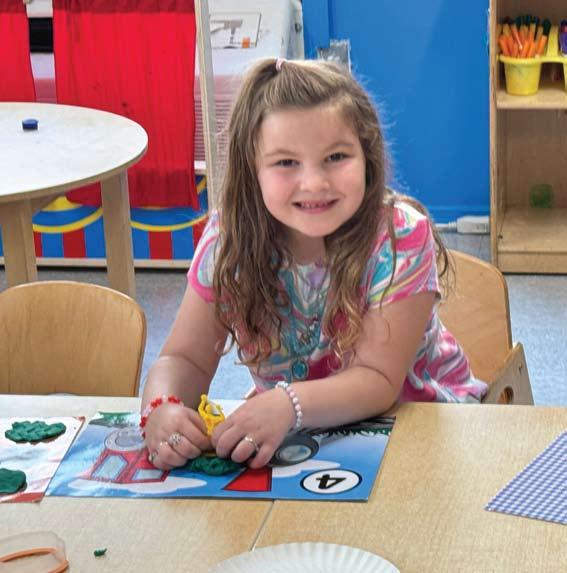

Marvin’s Camp
For Children with Special Needs
Marvin’s Camp is a social, educational, creative, and safe summer experience for kids and teens with special needs, ages 5-21. Campers enjoy fun activities and go on trips!
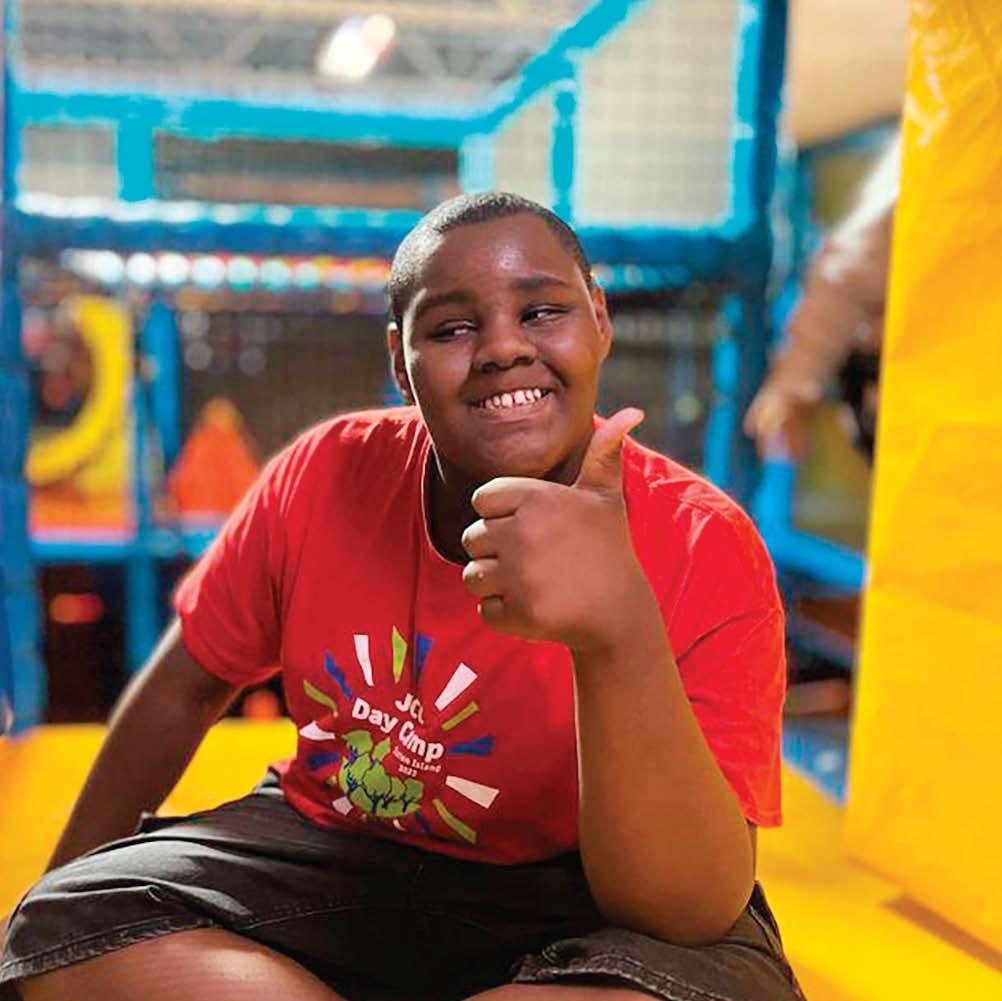
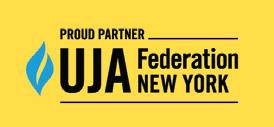



6 | education
Helping your differently-abled child succeed in school
8 | childcare
Choosing a babysitter for a child with special needs
10 | Family day o ut SUMMIT One Vanderbilt accessibility innovations
12 | s pecial child g lossary
Part of navigating a special needs or disability diagnosis is knowing the words used to describe it. Check out our helpful glossary
14 | s pecial n eeds listings
Helpful resources for the special need parent
Comments? Questions? Suggestions? Email Jeannine at jcintron@siparent.com Get news, tips and humor all month long: siparent.com/signup
November 2024
Publisher: Clifford Luster
e ditorial d irector: Jeannine Cintron
community content creator: Shara Levine
a ssociate Publisher: Erin Brof
advertising d irector: Stacie Goldberg d e P uty e ditor: Danielle Ramos e ditor-at-large: Donna Duarte-Ladd
s enior d igital e ditor: Thalia Fernandez
Partnershi P managers:
Lauren Alperin, Lauren Anchin, Joan Bergman, Mary Cassidy, Suzanne Cirigliano, Chris Cunnington, Lori Falco, Shelli Goldberg-Peck, LynnMarie Hanley, Lisa Herlihy, Nicole Miller, Janine Mulé, Nina Spiegelman, Gwen Tomaselli
marketing & s trategy d irector: Rosalia Bobé
marketing & e vents a ssistant: Ashley Rivera
sales & marketing a ssistant: Elana Cantor
marketing assistant: Lorens Morris
editorial assistant: Alexa Lutter
art d irector: Leah Mitch
Web d evelo P er: Sylvan Migdal g raP hic d esigners: Arthur Arutyunov, Connie Sulsenti
coNtact iNfoRmatioN advertising : (718) 260-4554 Advertising@NewYorkFamily.com circulation: (718) 260-8336 Tina@NewYorkFamily.com
address: New York Family Media/Schneps Media 15 MetroTech Center, Seventh Floor Brooklyn, NY 11201
President: Victoria Schneps-Yunis ceo : Joshua Schneps coo : Clifford Luster New York Family has been awarded the PMA Gold Award for for Overall Design and Bronze for Website General Excellence.



Follow us on Instagram @yourleapforwardnow
t ion Di s orde r P oo r M emo r y L an g uag e P r oc e ssing Disabi l i t ie s
V ocabu l a r y and Re ading F l u e n c y Re c e pti ve and Expr e ssive Lan g ua g e Dev e l opm e nt in W rit t en Expr e ssio n
Read i ng and Writin g Science , Social Studies and Mat h
SAT/ACT, TACHS , SHSAT PRE P Regents Review; all academic area s ELA and Math Test Preparation; al l levels and grade s YourLeapForward.com












































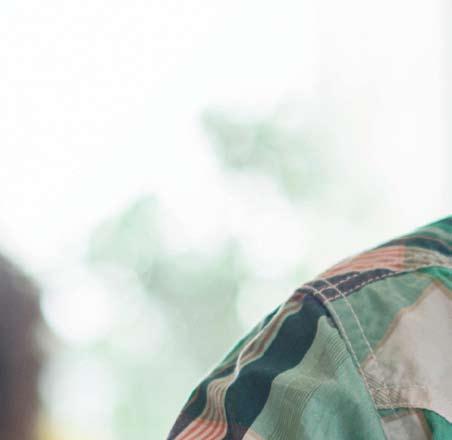

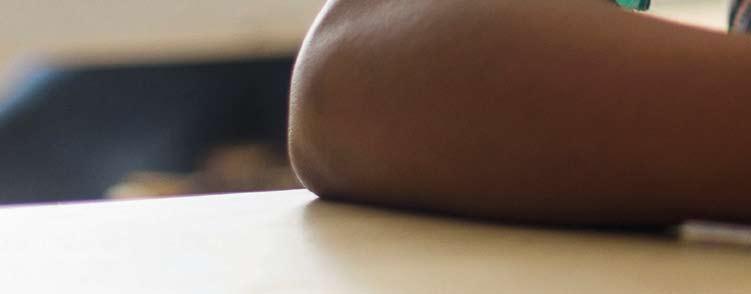






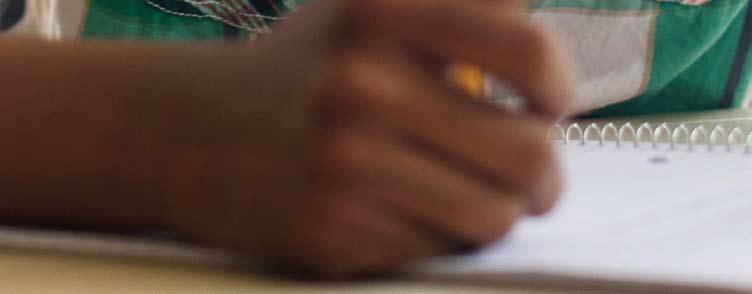
BY JACQUELINE NEBER
Good parent-teacher communication is crucial for any successful school year, but being on the same page becomes even more important when your child has a learning disability. There are a few steps–from understanding your rights to communicating on a regular basis with your child’s teacher–that can help ensure your child has the best year possible, arming you and your child with the knowledge to succeed in and out of the classroom.
Know your rights and speak up. Parents are entitled to receive information about special education from their schools and teachers—reading up and staying informed is the best way to advocate for your kid.
When attending Committee for Special
Education meetings, annual review meetings, or parent-teacher conferences, if you don’t understand something, ask questions.
Communicate with teachers frequently.
Kathy Devine and Emily Cole co-teach at an elementary school in Long Island. They say parents of students with special needs must be extra communicative with teachers.
“We would like to know sooner when things might be happening at home, whether it’s medication changes or maybe something in the home life has changed,” Cole says.
When it comes to homework, “reach out to us as soon as possible so that we’re not waiting until the end of a trimester to know [kids are] struggling,” Devine says.
Another tip? Write a letter describing your child and his needs at the beginning of the year.




Understand Individualized Education Plan goals.
Equally important is understanding your child’s IEP goals—which can differ from her classroom goals.
This difference often confuses parents who see their student accomplishing goals on one end of the spectrum and not the other.
Involve your child.
Cassie Reilly, Transition Coordinator at a Long Island high school, suggests involving your kid in IEP and parent-teacher conferences. Being open with kids from the time of diagnosis helps them stand up for themselves and understand their learning disability does not make them inferior to others.
Be sensitive to difference.
Parents should understand their kids might be different at home than at school, Reilly adds. And, even more importantly, their kids might have an atypical path toward success. Communicating with teachers is key to understanding how your kid can progress in the best way.

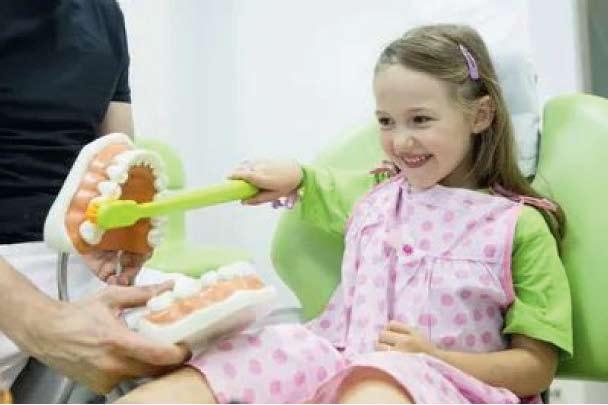
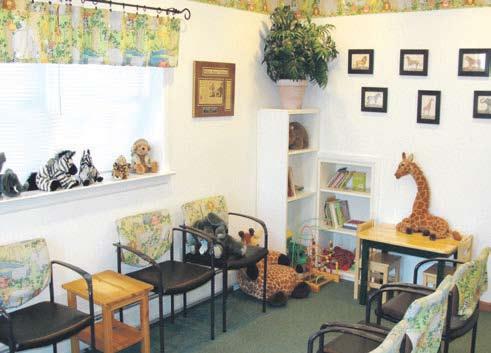



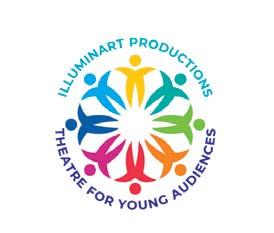

















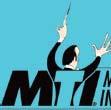










By Dana GreenBerG
My son has autism, so when I need to leave him with a babysitter, I am extremely picky about who that person is going to be. There are so many things that go through my head as a parent of a child with special needs. Who can I trust with him, especially since he has limited verbal skills? Will his babysitter understand his wants and needs? Will he be happy and engaged while I am gone? Over the years, I have come up with a system for choosing a babysitter that has worked well for us. This is how I do it.
There are some very good places that you may not have thought of for finding sitters for kids with special needs.
I contact local special education schools and therapy centers, both of which are wonderful resources for this. Try calling them, and you will usually be put in touch with the right person to help you out, such as a social worker or psychologist. When you speak with that person, let them know exactly they type of person you are seeking as a babysitter. Let her know how old your child is and anything else you think may be important to share. You will find that many teachers, teaching assistants, and therapists are looking to earn extra money. The social worker or psychologist can circulate your contact information among the staff. One of the best reasons to get sitters from these places is that they are already fingerprinted and have had background checks done. Referrals from other parents with special needs children can also work as a great resource for finding people. I find that we parents are each other’s best sources of information. You can fully describe your child to other parent without feeling like you need to hold anything back. With that information, they will know if they have someone who would be a good fit.

I like to meet as many potential sitters as I can. You may find that different people or personalities work better in different situations. I have some sitters that I prefer to use if they will be staying at home with my son and others that I prefer to use if they will be doing an outing with him. It is great to have choices, and not everyone may feel comfortable taking him out.
Another reason I like to meet a variety of people is more basic: We all need back-up. You just never know who will be free when you need someone. There have been times when I have gotten to my fourth call before getting a yes. I certainly was glad I had my list of trusted babysitters to call upon when that situation came up. The bigger the list you can compile, the better it will be in the long term. It is important to know that you have multiple great, trusted people to call upon.
After compiling my list of who I would like to meet, it is time to have initial interviews with them. The first time I meet a new person I prefer to do it alone, just me and them, without my son present. That’s because my son has very good receptive language and I do not like to talk about him in front of him. At these meetings, I like to tell the candidate all about
my son--his likes, his dislikes, his routines, what makes him happy, what bowl he likes for his snacks, that he likes ice cubes in his water, everything and anything that might be important to know while watching him.
I truly feel that I cannot give a sitter too much detailed information. I need to be his voice. We can also discuss how much I will pay. This is also the candidates’ opportunity to ask me anything that they want. Based on how this meeting goes, I will decide if I want to continue the process with each person I meet.
Now that I have done initial interviews, it is time to check references for those I am highly interested in hiring. It is a good idea to do this regardless of where someone’s full time job is. You may want to speak with someone else for whom they babysit (or babysat in the past) or maybe a supervisor or co-worker at their current job. Have your list of questions prepared before you make the calls.
You should feel free and comfortable to ask anything; after all, this is your child’s welfare we are talking about. Ask specific questions about the candidate’s interactions with children, how they’ve handled certain situations, and the like. I always like to ask about punctuality, too. This is the opportunity to get a feel for whether this person may be the right fit and if you want to
continue moving along with them.
Assuming the references check out, I next schedule a meeting between the potential new sitter and my child. The meeting takes place in my home. I will prepare my son the best I can, by telling him the person’s name and that they are coming over to see where he lives and what he likes to play with. Once they arrive I will make the introduction. I will show them around, pointing out where my son likes to hang out and where his favorite snacks are, for instance. I will go over how we do certain things, and our routines. I want all his babysitters to be comfortable handling anything that may arise while I am out.
This is another instance in which I have a list ready so I do not forget anything that may be important. Discussing all of these details in depth at this time will make it a lot easier the first time I go out and leave him with this person. I will not have to take the time then to go over everything from scratch, and instead we can just do a review.
This is also the chance to see how they
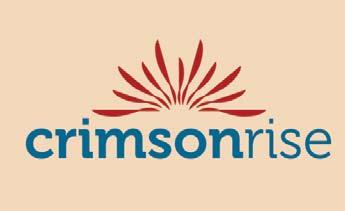

interact with him. I pay close attention and try to feel the vibe. Usually I can tell at this point if a particular candidate would be a good match for my son.
For those sitters who might take my son out, I will invite them to go on an outing with us. This is where I will train them on how to be outside with him, which is a very different situation than just staying indoors. There is a lot to know: He likes to scare birds, he may not want to hold your hand, he will constantly ask you how many more blocks you’re going. How will the babysitter react to all of this--or whatever else may come up while outside? His safety must be the priority. This person will need to be on high alert the entire time. I need to feel 100% confident that this sitter is up to this task, and they need to be prepared for the unexpected with him. I will guide them through this outing and see how they feel, and again ask if they have any questions or concerns.
The Babysitter’s Commute
Where a sitter lives is important to me. Just

Crimsonrise teachesthem tospellto communicate


because you are identifying candidates via a school or center it does not necessarily mean that they live nearby. I need to know that all candidates can independently get to and from my apartment. I need to make sure they understand that they will need to leave enough time for the trip. If you have a younger child, you will not want to have to pack them up to pick up or take the sitter home, especially at night. I find that most sitters can come and go on their own, but this is something I like to confirm before hiring someone. It is always good to make sure you are on the same page about anything that you think is important.
This is my process, the steps I like to go through when choosing a sitter for my child who has special needs. Every question is important and no detail is too small to mention. Make your lists, and do whatever it takes to put your mind at ease. Who we leave our children with is one of the most important decisions we make as a parent. We need to feel comfortable and confident with our decisions so we can go out and have peace of mind.
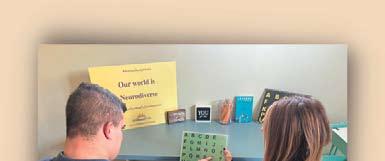

WhatisSpellingtoCommunicate(S2C)?
Itisamethodthatteachesthepurposefulmotortopointto lettersonaletterboardorkeyboardtoenablecommunication.
Whocanuseit?
Autistic,nonspeaking(formerlycallednonverbal)people,and peoplewhohavescriptedand/orunreliablespeech.
Howolddoesyourchildneedtobe?
Weworkwithallages.5yearsoldonwardstoadultsofanyage. 929-643-9101 Info@CrimsonRise.org www.CrimsonRise.org DoesyournonverbalAutisticchildcommunicate?

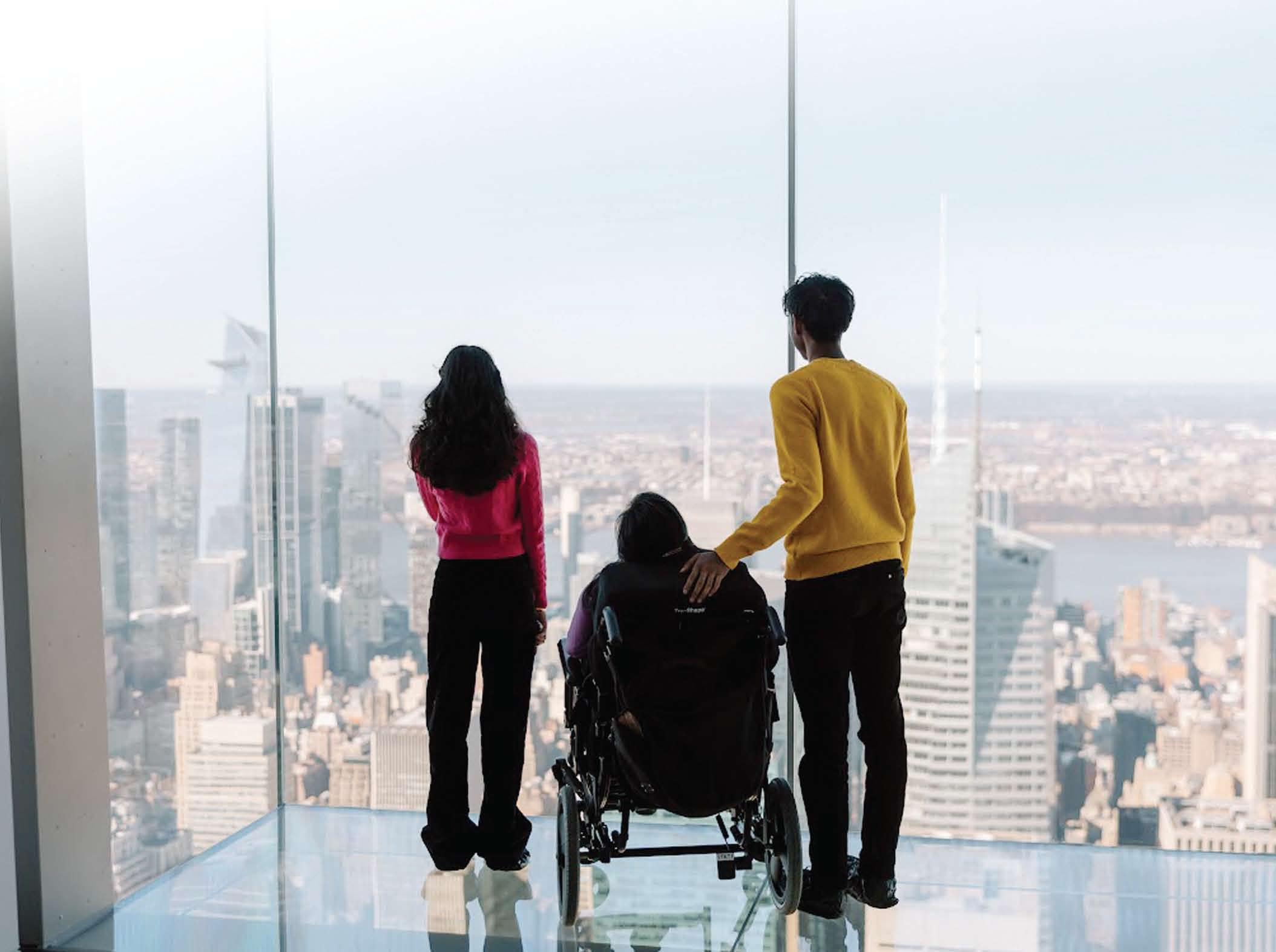
By Donna Duarte-LaDD
New Yorkers and visitors love their heights, and our skyscrapers are some of the most iconic in the world. SUMMIT One Vanderbilt, a three-level multi-sensory art immersion many of us have already visited, is one of those visual experiences. Yet, did you know they are super accessible too?
As we have shared before, when you are parents to a child with a disability or have a disability yourself, it can be overwhelming for all when wanting to visit a busy cultural spot. Already a multi-sensory experience, the SUMMIT One Vanderbilt observatory is suspended almost 1300 feet, where you can experience an eclectic showing of art, sky boxes, and a stunning observation deck designed to be interactive and engaging for visitors.
Advocacy is part of Summit One Vanderbilts fabric
From the beginning, SUMMIT One Vanderbilt has always woven accessibility into its experience. Their advocacy for change in how people with disabilities experience their space is something they have always invested in.
In partnership with Accessible Travel NYC, the local authority on inclusive travel in NYC, and created by Potter Productions, SUMMIT One Vanderbilt has unveiled a series of accessibility videos for marketing, training, and guest experience services highlighting the immersive space’s capabilities. It was amazing to learn about how important it has been to know about the experts who have helped shape their accessibility initiatives, for example, learning how to address neurodivergent people. The team at One Summit is invested in the underrepresented being seen and heard and is always open to learning to improve.
What we learned
We learned a lot, but the standouts that we feel will benefit families are:
• Service animals are welcomed
• Every level of SUMMIT One Vanderbilt is fully wheelchair accessible across all four levels
• You can contact One Summit (at least three weeks before the date you wish to visit) to request a Sighted Guide or an American Sign Language (ASL) interpreter
Visit summitov.com/accessibility to download Sensory Access Maps and social narratives and learn about their accessibility initiative.
SUMMIT One Vanderbilt Tickets: $43-$63
45 E 42nd St, New York, NY 10017
The entrance is located on the Main Concourse of Grand Central Terminal


Our Mission
At LCBS, we bridge the gap between success and failure, understanding and confusion, hope and despair for families. We nurture children with special needs, providing them with the tools to thrive in society.


ABA Group
Individualized learning for children with autism through enhanced group developmental intervention with a 1:1 aide.

Global Delays Group


Developmental learning groups tailored for children with global delays.


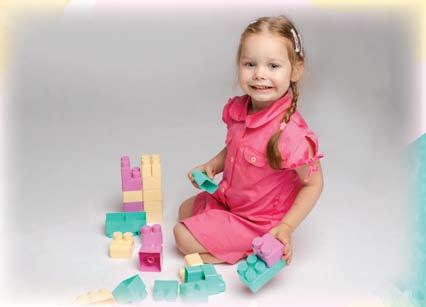

Our New Early Intervention Center in Staten Island LCBS, in collaboration with Early Intervention community, has created a unique space for children and families, offering 90-minute learning groups.
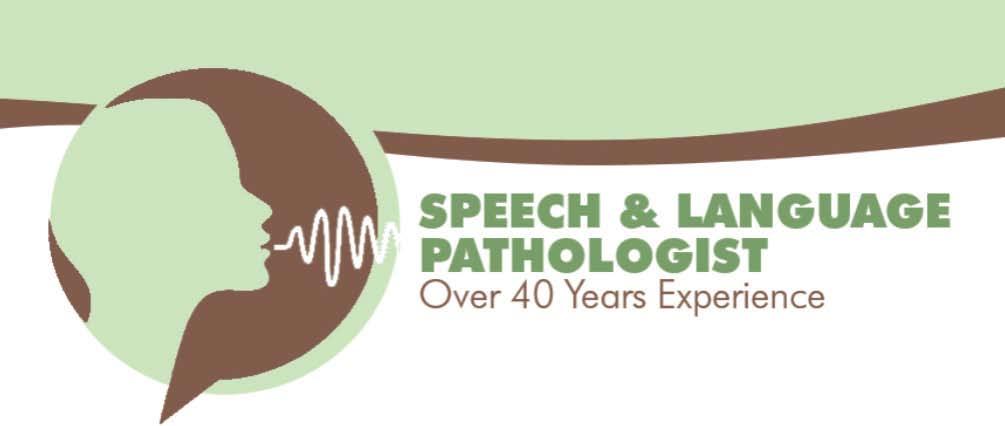

(929) 256-0231 dvandyke@lcbehavior.com


ophthalmologists
Our focus encompasses a range of conditions, including:
• Amblyopia, commonly known as "lazy eye"
• Strabismus, addressing eye misalignment
• Refractive issues such as myopia and astigmatism
• Congenital disorders, such as cataracts
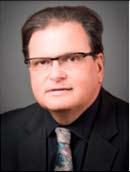
• Neurological conditions that may impact a child's vision
• Blunt ocular trauma
• Conjunctivitis (commonly known as "pink eye"),
• Blocked tear ducts
• Chalazia (Stye)

Keywords that every special needs family should know
By Mia Sala S
Part of navigating a special needs diagnosis is knowing the words used to describe it. But it can be intimidating to ask what everything means, especially when doctors or websites seem to be speaking another language with acronyms like “ERSS” and “OT”. We’ve all been in that confusing place before and, as parents, it’s not a fun feeling. That’s why, we’ve created a glossary for keywords that you may want to know as a parent of kids with special needs. This guide includes common special needs words, phrases, and acronyms so that you can feel more confident in your parenting journey!
Special Needs Diagnosis
Developmental disability: Physical, learning, language, or behavioral impairments that will delay your child’s development. ADHD, Autism, learning disabilities, etc. are all examples of developmental disabilities.
ADHD– Attention Deficit/Hyperactivity Disorder: A developmental disability that makes it difficult for your child to pay attention or stay focused. Look out for squirming and fidgeting, talking a lot, not being able to wait for their turn, or trouble concentrating.
ASD– Autism Spectrum Disorder: A developmental disability that may delay your child’s speech, motor, learning, and social skills. Early intervention (see below) can help improve skills.
Down Syndrome: A condition caused by an extra chromosome that affects how your child’s brain and body develop. Diagnosis typically happens before or during birth. Emotional Disturbance: Mental health disorders such as anxiety, bipolar, OCD, etc. that have no direct, identifiable cause. Be on the lookout for aggressive behavior,

withdrawal or nerves related to social environments, and vocal outbursts in public places.
Learning Disability: Difficulty learning and grasping new concepts. Learning disabilities include dyslexia (reading), dysgraphia (writing), and dyscalculia (math). See Special Education for more. Stutter: A speech disorder that makes it challenging for your child to say what they want to say. You may hear them repeat a sound a lot, hold one sound for a long time, or stop speaking mid-sentence.
OPWDD– Office of People with Developmental Disabilities: A New York organization that can help connect your family to nonprofit services, based on what kind of treatment/therapy they need, and provide funding.
Transition planning: Creating an action plan for what your child with special needs will do after high school. This is often a part of your IEP (see below).
Service provider: An agency or organization that will help your special needs family navigate some aspect of your journey. This could be everything from speech therapy to after school programs with a focus on special needs to horseback riding as a form of physical therapy.
INCLUDEnyc: A non-profit organization that
advocates for young people in NYC to be included in their communities: classrooms, workplaces, etc. They have super informative resources for parents of kids with special needs, and they can connect you with professionals who can help you navigate your options even further.
Inclusion: Everyone in the classroom feels welcomed by the school, teacher, and classmates. For special needs kids, inclusion is definitely a keyword to look for when choosing a school!
IEP– Individualized Education Program: A written plan for your child’s education as a special needs student. According to the NYC Department of Education (DOE), this means your child is guaranteed a free and appropriate public education in a Least Restrictive Environment (see below). Your child’s IEP will also include development and progress reports, evaluation results, specific needs, and anything else that is relevant to your child’s success.
IEP Teams: Your IEP team will be made up of you (as a parent/guardian), a school psychologist, a special education teacher (and sometimes a general education teacher), and the district representative. It may also include a school physician or other service providers who have worked with your child.
LRE– Least Restrictive Environment: Your child will be in a classroom with kids who do not have special needs.
SETSS– Special Education Teacher Support Services: Either a special education teacher will design specific activities for children with special needs or the special education teacher will collaborate with the general education teacher to modify the entire classroom to accommodate.
SEDL– Special Education Distance Learning: Modifying special needs education for virtual/online students. This became especially important during the pandemic.
SWD– Students With Disabilities: Used to refer to special needs children in the classroom.
SC– Special Class: If your child’s needs cannot be met in a general education classroom, they will have all classes taught specifically by a special education teacher. These classes are typically very small in NYC schools, with up to 12 students for elementary/middle school and up to 15 for high school.
PBIS– Positive Behavioral Interventions & Support: NYC school-wide approach that encourages positive behavior instead of punishing or pointing out the negative. One example of this is changing a poster from “No Food. No Weapons. No Drugs.” to “School Rules: Be Safe, Responsible, Respectful”. This positive environment is especially important for special needs education.
ADL– Activities of daily living: Day-to-day actions like brushing your teeth, going to the bathroom, walking up and down stairs, etc. that are used to determine your child’s diagnosis and progress.
Early intervention: Services and support for infants and young children with developmental disabilities. Early intervention can often help improve your child’s skills and progress.
OT– Occupational Therapy: Focuses on ADL’s (see above) and other everyday skills that your child will work on.
PT- Physical Therapy: Focuses on physical

Person Centered Care Services is a not for profit organization creating social change within communities by supporting people with disabilities on their search for identity and acceptance.
Our responsibility as human beings is to support ourselves and one another
To participate in community is to have active citizenship. To be a participating citizen, one must have opportunities which are equitable; which accommodate the differences all human beings have.
One of the most vital components of having a quality of life is love. It’s okay to tell someone you love them; more importantly, it’s okay to show them. To accept another for who they are and what makes them human can be a most validating experience; it is self-empowering.
SERVICES OFFERED: Day Supports • Residential Supports • Housing Rental Subsidy Career Supports • Community Habilitation • Respite Family Education & Training • Self-Direction 150 Granite Ave, Staten Island, NY 10303 718-370-1088 info@pccsny.org www.pccsny.org Connect with us! @pccsny
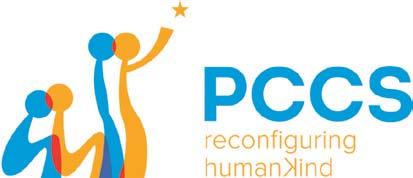

developmental disabilities and helps your child with mobility and movement.
Speech pathology: Focuses on language and speech disabilities to help your child communicate their thoughts.
Regression: Your child loses skills that they previously had. If regression happens, you may want to revisit and revise your child’s IEP (see above).
AT– Assistive technology: Any device that helps your child’s special needs by improving their capabilities. AT’s include wheelchairs, text to speech, voice recognition, and more.
ABA– Applied Behavior Analysis: A positive-reinforcement program designed to understand your child’s behavior in real life situations. It is most commonly used for children with Autism, but it can also be effective for other developmental disabilities.
Developmental milestones: Key movements, expressions, speech etc. that show your child’s progress. For little ones, this may include smiling at people, crawling, copying sounds, and reaching for toys.
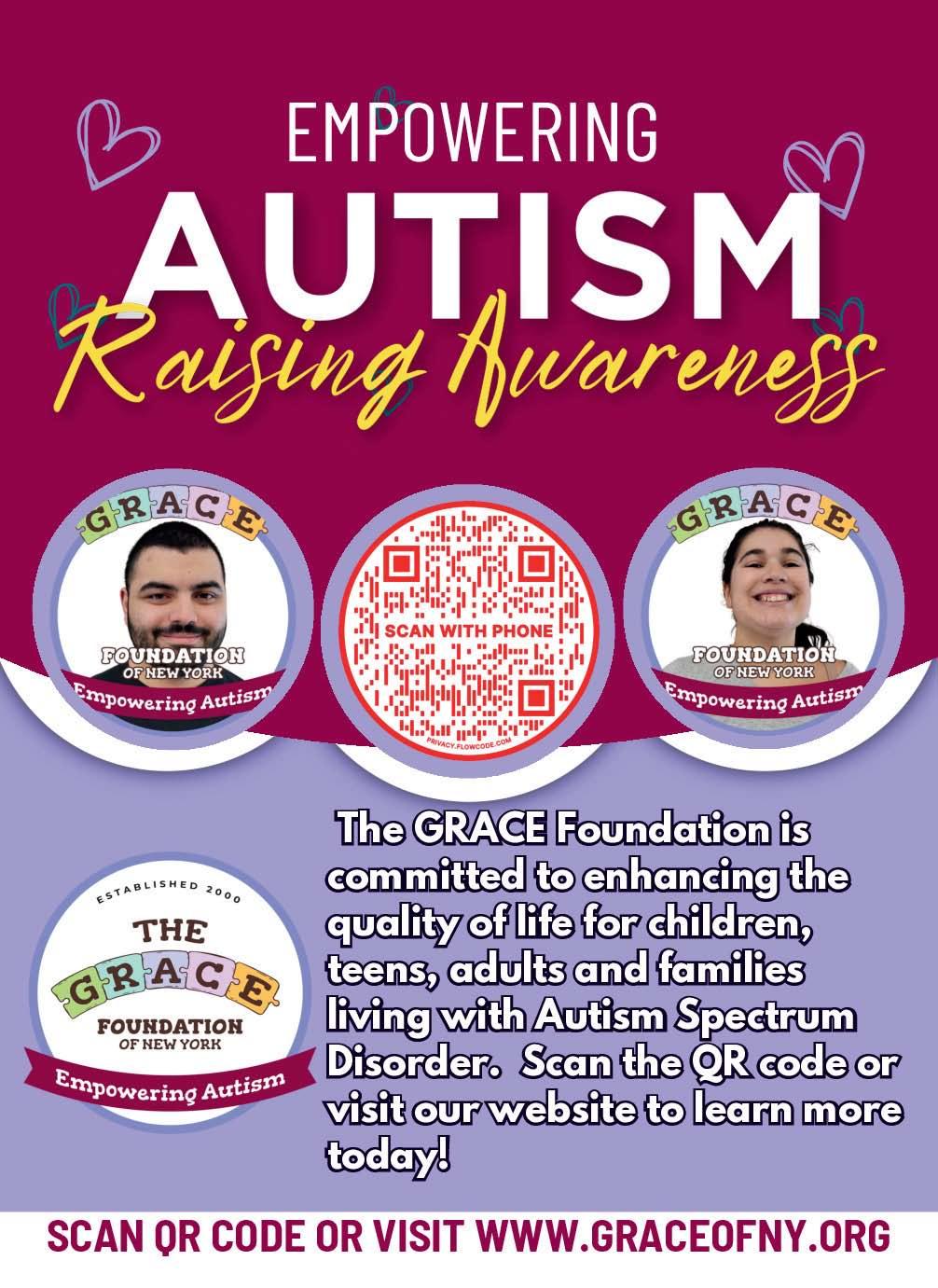
a very s pecial Place
49 Cedar Grove Avenue 718-987-1234 info@avspny.org avspny.org
A Very Special Place, Inc. (AVSP) was established in 1974 as a not-for-profit organization and today serves more than 1,600 people in Staten Island, Brooklyn and Manhattan. AVSP provides a comprehensive network of programs and services for people with intellectual and developmental disabilities and their families. Programs include day habilitation, residential, self-direction, respite and community habilitation. With the guidance and support offered at AVSP, people of all ages find opportunities to achieve independence and self-fulfillment.
the community school 11 W Forest Avenue, Teaneck, NJ
High School: 201-862-1796 CHSoffice@communityschool.
k12.nj.us
1135 Teaneck Road, Teaneck, NJ
Lower School: 201-837-8070 office@communityschool.us communityschoolnj.org
The Community School serves the bright child with learning and attentional disabilities. For 56 years, the school’s primary goal has been to help children achieve a level of classroom performance that is fully commensurate with their abilities, intellects and talents. Community School welcomes students from New York and New Jersey, and is located just over the George Washington Bridge, in Teaneck, NJ.
crimson r ise 1015 Castleton Ave. crimsonrise.org info@crimsonrise.org CrimsonRise teaches nonverbal individuals with autism, ages 5 to 60+, communication access through the

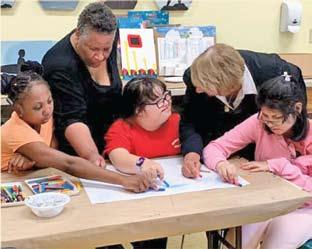

Spelling to Communicate (S2C) method. S2C teaches purposeful motor skills to point to letters on a board or keyboard. Through this method, CrimsonRise enables individuals to express their thoughts and emotions. CrimsonRise’s services include one-on-one coaching with parent training and S2C based programs and services. CrimsonRise is uniquely co-founded and guided by nonverbal individuals with autism who gained their voice through S2C.
dJ m asters academy
265 Main St. 929-899-0939 facebook.com/ groups/766611651761435 djfrankiejteaches@gmail.com
With over 10 years of experience in the special needs community, DJ Masters Academy offers DJ lessons for children of all abilities. Led by Frank Jaconetti, a seasoned DJ with 25+ years
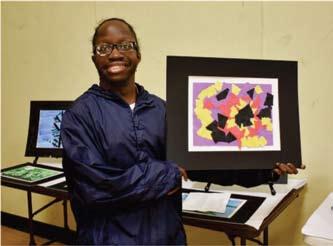

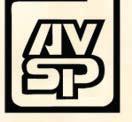

of experience in the industry, the academy provides training in DJing, singing, emceeing, mixing, video/audio, and line dancing while helping students build confidence and creativity through the art of DJing. They proudly accept self-direction— creating smiles, one beat at a time.
d r. Phyllis g . m erlino Todt Hill Pediatric Dentistry 268 Todt Hill Road 718-761-2090
drmerlino.com
Dr. Phyllis G. Merlino, a Board Certified Pediatric Dentist treats children of all ages and is specially trained to treat patients with special physical, mental and healthcare needs in a calm and caring atmosphere. The office is committed to quality dental services that ensure your child continues on the path toward a bright future of good oral health. Children are not always willing to visit

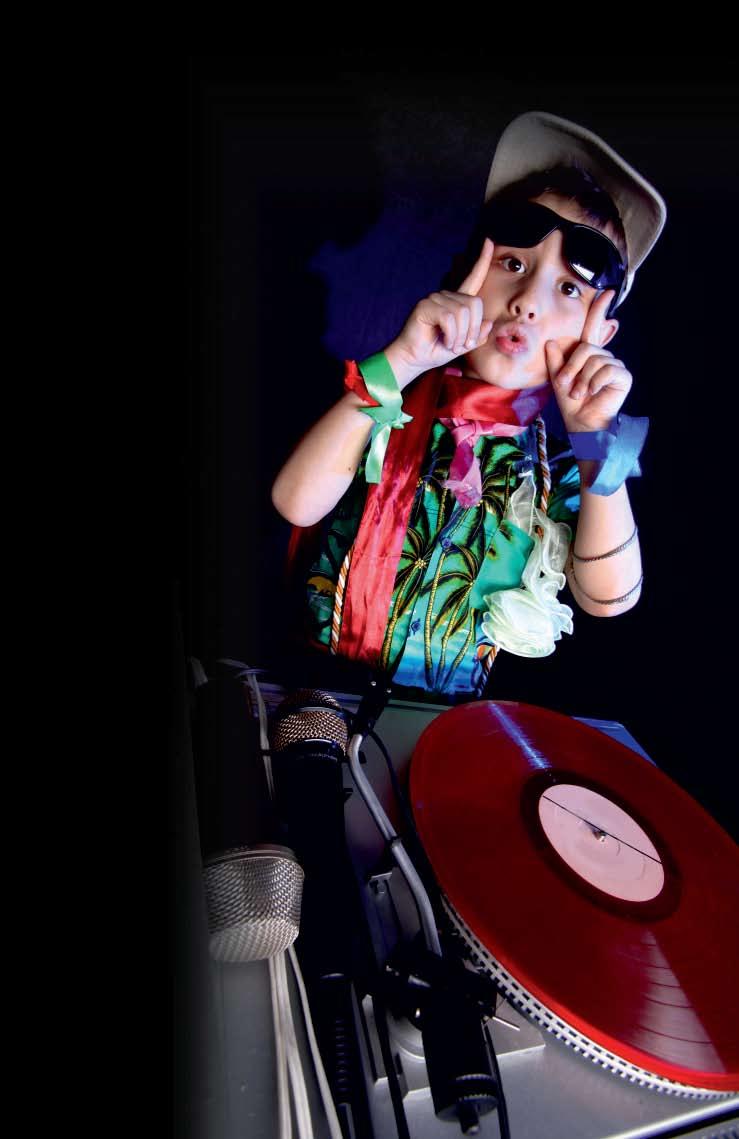


the dentist and Dr. Merlino strives to make the experience of each visit more positive for them.
the g race Foundation
460 Brielle Ave.
718-983-3800
graceofny.org
The Grace Foundation improves the lives of individuals and families affected by Autism Spectrum Disorder (ASD). Grace provides programs including Site Based Respite/In-Home Respite, Day Hab, Com Hab and for ages 5-30. The ultimate goal is to enable individuals with ASD to lead independent and productive lives.
illuminart Productions
1000 Richmond Terrace 347 951 9650 ext. 1 our.show/seussical24 ariel.illuminart@gmail.com
Join for a sensory-friendly showing of Seussical the Musical on Nov. 16 at 11am.
Step into Dr. Seuss’s whimsical world where Horton hears a Who, the Cat in the Hat stirs up fun, and your favorite characters come to life. Other showtimes: Nov. 9, 10 and 16 at 2pm, Nov. 17 at 11am.
Joan & alan b ernikow J cc of staten i sland 1466 Manor Road 718-475-5200
At the Joan & Alan Bernikow JCC of Staten Island, children with special needs can find the support they need in a fun and nurturing environment. The JCC offers an array of programs for children with special needs, including First Foot Forward for preschool-age children, Marvin’s Camp for children ages 6 to 21, after school activities for kids and teens, a Girl Scouts troop, inclusion opportunities in traditional programs, and more.
leaP - i mmersive learning center
Fusion Programs
300 Cromwell Ave. 718-351-2710
YourLeapForward.com
LEAP is an immersive learning center founded by Dr. Maria Casale, serving families of Staten Island for over 25 years. Leap has successfully partnered with parents in the education of children who require a holistic approach to teaching. In 2022, Fusion Programs was co-founded. Fusion Programs is a state-of-the-art facility inclusive of culinary arts, graphic arts/video production, fitness/dance and more. Fusion programs are designed to harness the natural strengths and talents of participants using progressive, brain-balanced approaches.
lifetime changes b ehavior services
683 Henderson Ave.
929-256-0231
lcbehavior.com lifetimechangesbehavior@ gmail.com
Lifetime Changes Behavior Services is an NYC early intervention agency that helps children with disabilities. Free service for all NYC families, free transportation services are also available. LCBS is accepting family tours; spots are available in the morning and afternoon. Call Dana Van Dyke at 718682-1831 or 929-256-0231 to set up a tour.
los n iños
505 8th Avenue, NYC Floor 12A, Room 2
Los Niños Services is an award-winning agency serving the developmental needs of children and their families. They specialize in home and community-based ABA, special instruction, speech, occupational, and physical therapies. All staff are experienced clinicians

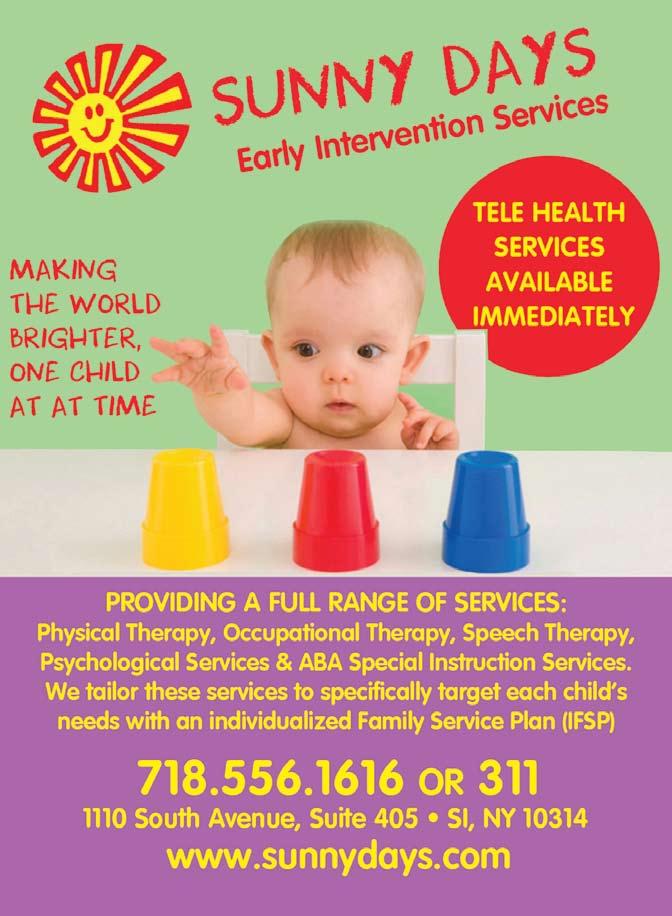
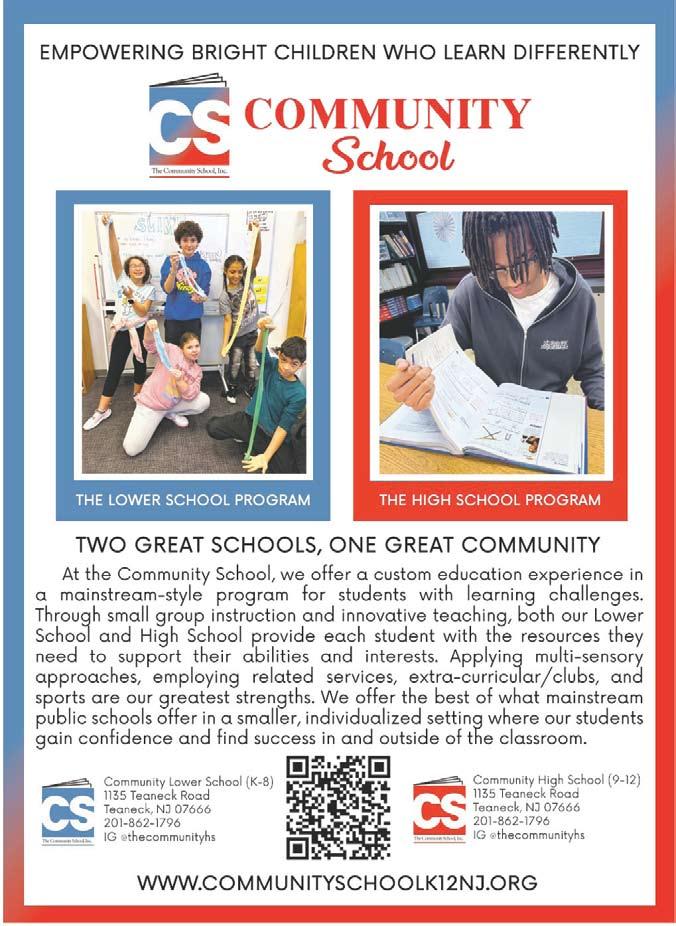

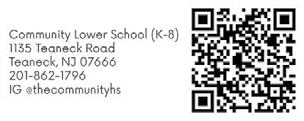

who pride themselves on being of great service to others. Serving children and families in Westchester and New York City boroughs. The programs through which they provide services are the Early Intervention Program and ABA through private insurance.
nh PP Pediatric o phthalmology
2504 Richmond Rd. 718-667-1010
Sipedsoptho@Northwell.edu
It is crucial for parents to recognize ocular manifestations can often be early indicators of systemic disorders. The Pediatric Ophthalmology team at Northwell Physicians Partners collaborates with pediatricians and specialists to ensure coordinated care for children with various health challenges. Board-certified and fellowship-trained pediatric ophthalmologists provide compassionate, comprehensive care using state-of-the-art
medical technology. Dedicated to individualized attention and the latest advancements, the team strives to empower each child with optimal vision and eye health outcomes.
o ur Journey n P Psychiatric services
1036 Victory Blvd.
845-669-7060
info@ourjourneysi.com ourjourneysi.com
Our Journey NP Psychiatric Services is a private practice providing comprehensive psychiatric care for individuals ages 4 through adulthood. They offer psychiatric evaluations, medication management, ADHD testing and treatment, addiction management, psychotherapy, and psychosocial evaluations. Additionally, they conduct evaluations for housing and other support services.
Person centered c are services
150 Granite Ave. pccsny.org
info@pccsny.org
Person Centered Care Services is a not-for-profit organization creating social change within communities by supporting people with disabilities on their search for identity and acceptance. Services available include Community Supports, Residential Supports, Career Supports, Day Supports, Family Education & Training, and Self-Directed Supports.
s andra m azzucco, s peechl anguage Pathology 465 Belfield Ave 917-825-9005
Providing speech and language therapy to the Staten Island community for over 40 years for toddlers up to seniors. Specializing in fluency and stuttering, language and feeding disorders.
PROMPT trained for Apraxia of speech and phonological and articulation disorders. ASHA certified. New York state license in Speech and Language Pathology. Department of Education RSA accepted.
s unny days consulting services
1110 South Ave., Suite 405 718-556-1616 sunnydays.com
Sunny Days provides homebased evaluations and ongoing therapy for infants and toddlers (ages birth to three years) suspected of having any developmental delays. They offer Speech Therapy, Occupational Therapy, Physical Therapy and Special Educational services. Services are funded by the NY State Department of Health. No out of pocket expenses necessary.

